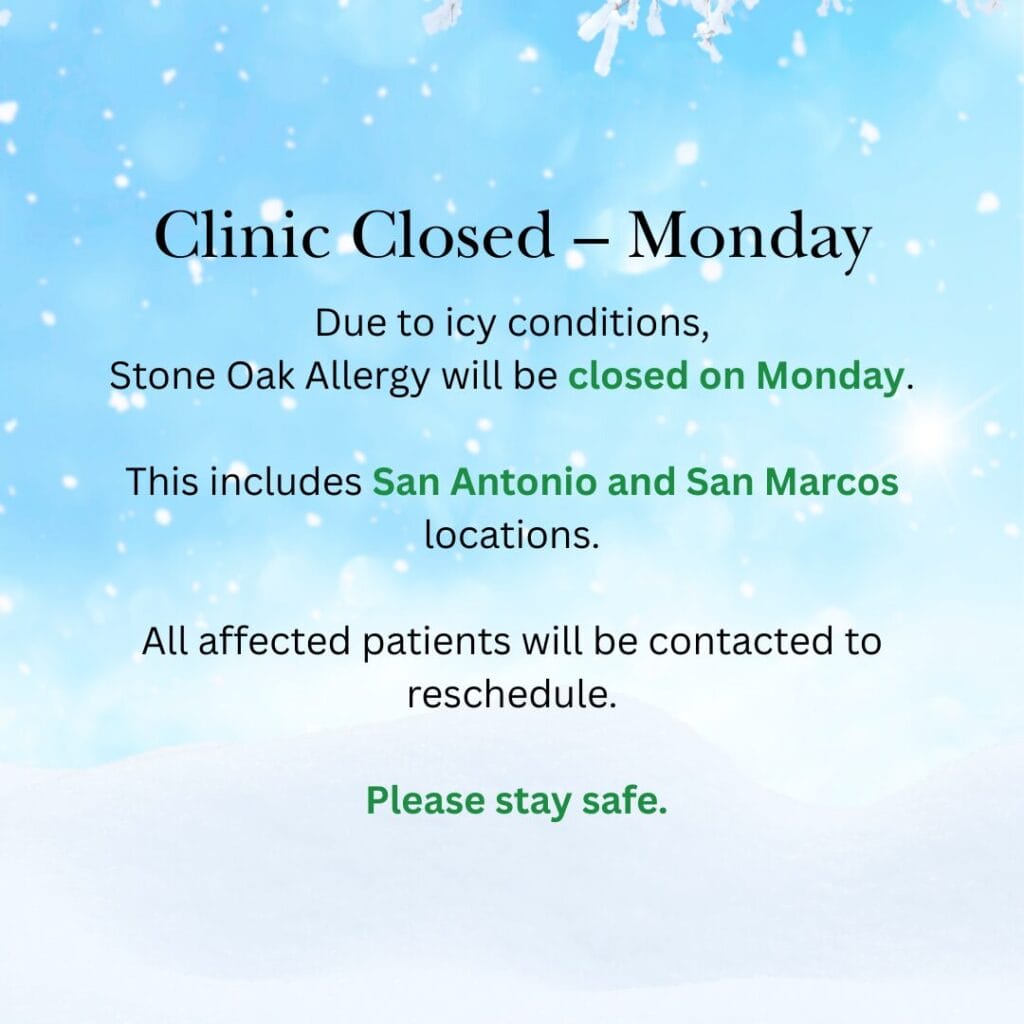San Antonio boasts a booming economy and a rich cultural diversity that set it near the top of many lists of the nation’s fastest-growing cities. Likewise, projections show that San Marcos’s population may nearly double in the next decade. Once we welcome our new residents, they may notice one of South and Central Texas’s notable downsides – seasonal allergies!
Our area features a robust menu of airborne allergens that wreak havoc on people’s health and happiness. Astonishingly, the Asthma and Allergy Foundation of American ranks San Antonio as the fourth most challenging city in the US for fall allergy sufferers and the fifth worst for spring allergies.
While many parts of the country experience an allergy reprieve during the freezing winter months, we see no such relief. Runny noses, coughs, and itchy eyes abound December through mid-February thanks to the infamous mountain cedar tree. (Oddly, the tree is rarely called by its real name, Ashe juniper.) The male mountain cedar tree releases puffs of up to a billion pollen grains that then get carried for miles by the wind. The pollen clouds float around and sometimes resemble smoke.
The mountain cedar causes “cedar fever,” which does not actually include a fever but is the colloquial term for an allergic reaction to the trees. Cedar fever refers to intense and sometimes debilitating allergy symptoms including nasal congestion, incessant sneezing, itchy/red/burning eyes, sore throat, headache, and fatigue. People may even miss work or school due to the severity of these symptoms.
Once cedar fever mercifully dies down, the new growth and promise of spring bring other tree pollen issues that peak in March and April but can linger through late May. The trees that most affect the our area include oak, hackberry, Arizona ash, and willow. Live oak pollen is especially visible and problematic during this time, as it coats cars, pets, sidewalks, and backyard grills in a fine yellow powder. Oak trees cannot be pollinated by bees since they produce no flowers, so instead they release their dust-like pollen into the air. Warm, dry, and windy conditions are a spring allergy-sufferer’s enemy because that is when pollen really gets tossed through the air.
Another change in season brings a change in allergy triggers. Early summer welcomes grass pollen to the forefront of the allergy forecast. Grass pollen spreads thanks to the same warm, dry, windy conditions as tree pollen, and frequent lawn mowing churns everything up and throws the pollen and even dust into the air.
Fall finds the kids going back to school, the start of football season, and relief that the dog days of summer are over. Many people take advantage of the dip in temperatures by heading outdoors. Unfortunately, weed pollens also like to come out and play in the fall. Ragweed is the worst offender. It begins sending its pollen out with the wind once cooler weather approaches. Ragweed can grow taller than a person and produces a ton of potent pollen. Weed pollen usually peaks in October and begins to lessen in November – just in time for mountain cedar to make its unwelcome appearance in December.
Mold falls into a unique category as an environmental allergy trigger that comes and goes year-round. Mold counts can peak during the summer and fall months, especially after it rains. A mold spore explosion is especially likely after a heavy rain followed by sunny skies and high temperatures.
Living in San Antonio or San Marcos does not doom you to suffer from hay fever (allergic rhinitis) forever! If you find yourself experiencing persistent allergy symptoms like runny nose, sneezing, itchy or watery eyes, and congestion around the same time(s) each year for weeks or even months at a time, you may be one of the many Texans battling seasonal allergies. One of Stone Oak Allergy’s highly trained physcians will guide you through the process of identifying your allergy triggers. Based on your allergens and symptoms, an individualized treatment plan will address your needs. Medication can work wonders in some patients. Others select traditional immunotherapy or cluster immunotherapy (allergy drops or shots), which builds up your body’s immunity to an allergen over time. Book an appointment today before your allergy symptoms start for the season so we can help you win the allergy battle!
